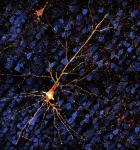(Press-News.org) A fingerprint may soon be all a doctor needs to check whether tuberculosis patients are taking their antibiotics – thanks to a new study led by the University of Surrey.
Scientists successfully detected the drugs in finger sweat – and with almost the same accuracy as a blood test.
Professor Melanie Bailey, an analytical chemist and co-author of the study from the University of Surrey, said:
“Up until now, blood tests have been the gold standard for detecting drugs in somebody’s system.
“Now we can get results that are almost as accurate through the sweat in somebody’s fingerprint. That means we can monitor treatment for diseases like tuberculosis in a much less invasive way.”
Curable tuberculosis (TB) is treated with antibiotics. If patients don’t stick to their full course, the treatment might not work, leading to drug-resistant TB instead.
Scientists wanted to know when was best to test, and whether they could tell how much medication the patient had taken.
To do so, they tested ten TB patients at the University Medical Center Groningen (UMCG), in the Netherlands.
Dr Onno Akkerman, a pulmonary physician with focus on tuberculosis from the UMCG said:
“It was very simple to collect our samples. We asked patients to wash their hands, put on a nitrile glove to induce sweating, and then press their fingertips onto a paper square.
“Finger sweat can be collected without any specialist training. Unlike blood, it isn’t a biohazard, so can be transported and stored much more easily.
“We’re looking forward to working with Surrey to detect other TB drugs using this promising technique.”
The samples were shipped to Surrey’s Ion Beam Centre and they were analysed using mass spectrometry – which breaks the sample down to see what it is made of.
Scientists detected antibiotics in finger sweat with 96% accuracy. The metabolite, produced by actually ingesting the drug, showed up with 77% accuracy.
The drug itself was present between one and four hours after ingestion, while a metabolised version showed up best after six hours.
Dr Katie Longman, co-author of the study from the University of Surrey, explained:
“Doctors need to check whether tuberculosis patients are taking their antibiotics. It's much quicker and more convenient to do that using fingerprints rather than taking blood.
“This could ease the time pressure on a busy health service and offer patients a more comfortable solution.
“For some patients, like babies, blood tests are not feasible or desirable – so techniques like this one could be really useful.”
The study is published in the International Journal of Antimicrobial Agents.
ENDS
END
Scientists can now detect antibiotics in your fingerprints – aiding the fight against drug-resistant TB
2024-06-25
ELSE PRESS RELEASES FROM THIS DATE:
Heart disease model puts cells to work
2024-06-25
By Leah Shaffer
Using animals to study heart disease doesn’t always translate well to human health outcomes, and human heart cells available for research don’t work outside the human body.
“You can’t keep them alive, much less function outside of the person for long enough to study these processes,” said Nathaniel Huebsch, an assistant professor of biomedical engineering in the McKelvey School of Engineering at Washington University in St. Louis. Huebsch is studying cells with a mutation that causes hypertrophic cardiomyopathy (HCM), a disease that can set off heart failure ...
Positive emotion skills combat burnout among health care workers
2024-06-24
Intervention improved well-being in workers who were highly stressed by the job
Health care worker burnout was on the rise before COVID-19 and continues today
Addressing significant structural barriers in U.S. health care ‘needs to be a top priority’
Easily accessible individualized solutions also are needed to boost well-being in stressed health-care workers
CHICAGO --- The COVID-19 pandemic exacerbated already rising rates of burnout among American health care workers. A new Northwestern University study found learning and practicing skills that increase positive emotion like gratitude, mindful awareness and self-compassion ...
Partridge receives Department of Energy Vehicle Technologies Office Lifetime Distinguished Achievement Award
2024-06-24
Bill Partridge, a recently retired distinguished researcher at the U.S. Department of Energy’s Oak Ridge National Laboratory, was recognized by DOE’s Vehicle Technologies Office, or VTO, for leading world-class research in transportation throughout his 25-year career. His expertise has guided the development of advanced diagnostic tools that enabled next-generation engines and emissions control systems.
Partridge was presented the Lifetime Distinguished Achievement Award during the VTO Annual Merit Review held on June 3, 2024, in Washington, D.C. He was nominated for the award by the VTO Decarbonization of Offroad, Rail, Marine ...
ACP offers recommendations to support LGBTQ+ health care equity
2024-06-24
Embargoed for release until 5:00 p.m. ET on Monday 24 June 2024
Annals of Internal Medicine Tip Sheet
@Annalsofim
Below please find summaries of new articles that will be published in the next issue of Annals of Internal Medicine. The summaries are not intended to substitute for the full articles as a source of information. This information is under strict embargo and by taking it into possession, media representatives are committing to the terms of the embargo not only on their own behalf, but also on behalf of the organization they represent.
----------------------------
1. ...
Survey shows aspirin use remains high among older adults, despite risks
2024-06-24
Embargoed for release until 5:00 p.m. ET on Monday 24 June 2024
Annals of Internal Medicine Tip Sheet
@Annalsofim
Below please find summaries of new articles that will be published in the next issue of Annals of Internal Medicine. The summaries are not intended to substitute for the full articles as a source of information. This information is under strict embargo and by taking it into possession, media representatives are committing to the terms of the embargo not only on their own behalf, but also ...
New research shows why you don’t need to be perfect to get the job done
2024-06-24
When neuroscientists think about the strategy an animal might use to carry out a task – like finding food, hunting prey, or navigating a maze – they often propose a single model that lays out the best way for the animal to accomplish the job.
But in the real world, animals – and humans – may not use the optimal way, which can be resource intensive. Instead, they use a strategy that’s good enough to do the job but takes a lot less brain power.
In new research, Janelia scientists set out to better ...
Detection and genetic analysis of songling virus in Haemaphysalis concinna near the China-North Korea Border
2024-06-24
https://www.scienceopen.com/hosted-document?doi=10.15212/ZOONOSES-2024-0004
Announcing a new article publication for Zoonoses journal. Songling virus (SGLV) is a spherical, enveloped, fragmented, negative-stranded RNA virus belonging to the genus Orthonairovirus in the Nairoviridae family. SGLV is transmitted by ticks and can cause disease in humans. This study identified and characterized SGLV in Haemaphysalis concinna ticks collected in 2023 in the Yanbian Korean Autonomous Prefecture (China) near the China-North Korea border.
A real-time quantitative ...
Leading the way in nursing home care
2024-06-24
A researcher at the University of Missouri has developed a program that improves the quality of care and reduces avoidable hospitalizations in nursing homes — saving Missouri nursing homes and Medicare millions of dollars and allowing Missouri nursing homes to invest more in retaining their most skilled staff members. The program is so successful that it’s being recommended for use in all 50 states.
The Quality Improvement Program for Missouri (QIPMO) was created by Marilyn Rantz in 1999 as a partnership between Mizzou’s Sinclair School of Nursing and the Missouri Department of Health and Senior Services.
For the past 25 years, the program has allowed Rantz and ...
Exploring early stage Alzheimer’s disease
2024-06-24
Research in nonhuman primates is opening the possibility of testing treatments for the early stages of Alzheimer’s and similar diseases, before extensive brain cell death and dementia set in. A study published June 21 in Alzheimer’s & Dementia: The Journal of the Alzheimer’s Association shows up to a six-month window in which disease progress could be tracked and treatments tested in rhesus macaques.
“This is a very powerful translational model to test interventions that target the tau protein,” said John H. ...
University of Cincinnati study: Signaling pathway in brain helps maintain balance, prevent cognitive deficit
2024-06-24
A new study led by University of Cincinnati researchers sheds new light on the role of a signaling pathway in the brain to maintain health and prevent inflammation and cognitive deficits.
UC’s Agnes (Yu) Luo, PhD, is corresponding author on the research, published June 21 in the journal Nature Communications, and focused on a signaling pathway called TGF-β that plays a number of roles depending on where it is located in the body.
Luo explained that signaling pathways in the body control different cell functions and require two components: a type of molecule called a ligand and a receptor that the ligand binds to and ...



